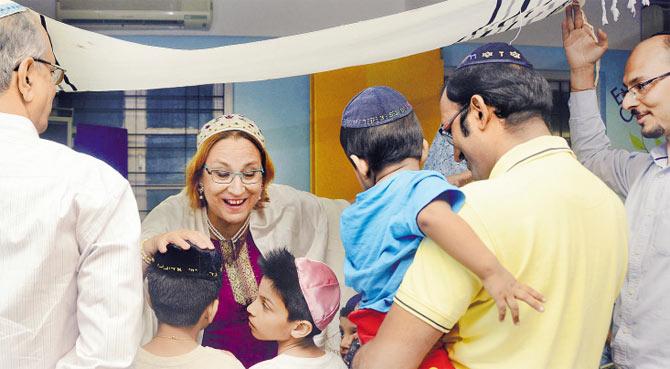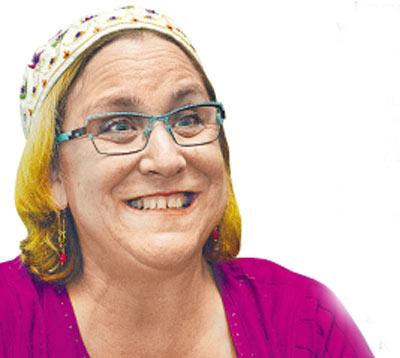From blowing the shofar to dancing with the Torah, American rabbi Judith Edelman-Green on reforming Judaism

Rabbi Judith Edelman-Green

Rabbi Judith Edelman-Green blesses Jewish children on the occasion of Simchat Torah last Sunday evening. PICS/SNEHA KHARABE
ADVERTISEMENT
RABBI Judith loves to dance,” says an attendee on Sunday evening, at the celebrations for Simchat Torah, a jovial Jewish holiday dedicated to the holy book of Judaism. Members of the Jewish Religious Union (JRU), a group of progressive Jews in the city, have gathered at a community centre along with Rabbi Judith Edelman-Green (58).
Edelman-Green, who belongs to the Reform Judaism movement, is one ofthe few 500-plus female rabbis (some sources indicate 600- plus) to be ordained in the course of the faith’s three millennia history.
In town for the Jewish holidays, which commenced with the New Year, Rosh Hashanah, on the evening of October 2, EdelmanGreen — dressed in a sequinned magenta kurti and lehenga, with mehendi adorning her feet— chats with us about Reform Judaism. Edited excerpts from the interview.
I am intrigued by this beautiful kippa you are wearing. I was under the impression that only men wore kippas.
The kippa is a symbol of my respect for something above me. When I am acting as a rabbi, blessing or even reading the Torah, I wear the kippa. I don’t wear it100 per cent of the time. But in my role as a rabbi, even in this interview, I wear my head covering. Fifty years ago, you wouldn’t have seen women wearing the kippa. It has come with the modern age and is quite recent. Itis a sign of equality — both men and women wear it now.

Rabbi Judith Edelman-Green
How did your journey as a female rabbi begin?
I do not come from a religious family. We kept holidays like Hanukkah, which is like Diwali; we observed the Jewish New Year and we went to Sunday school, but my parents were more secular than religious. So nothing about my journey is expected. It’s all my choice. I love Judaism deeply and the equality of women just makes sense to me.
But, I did not study to become a rabbi until I was 47, and it takes a ridiculous number of years to become a rabbi. I got two masters degrees — one in social work and another in Jewish studies at a theological seminary in Jerusalem — after which, I applied to become a rabbi. I studied the Liberal branch of Judaism, which makes sense because I am a woman.
I had surprisingly great reactions from everyone — my husband and orthodox parents-in-law were so proud and pleased. My children encouraged me and said it was fine as long as I didn’ttell them whatto do.
What brought you to Mumbai?
The things that pulled me into Judaism were social action, activism, equality for women and my love for music. Music is one of the most spiritual things in life; it can raise you from everyday difficulties and can bind people together.
I was playing the guitar and singing at a women’s study session in Jerusalem, and a woman came up to me and said, “Oh I wish you could do this Mumbai!” I replied, “I can! I can!”
I came here first in 2010 to sing with my guitar and read from the Torah. But the funny story is that though I play a stringed instrument, a week before I came to India, they asked me if I would be their shofar [a musical instrument fashioned from a ram’s horn] blower. But I quickly learned it.
What are the differences and similarities between Orthodox Judaism and Liberal Judaism?
There are differences in belief and practice. There are also many similarities — the same holidays, same way of life, and basic values, like respect for one’s parents, and the Ten Commandments.
However, Orthodox Judaism sees the Torah as given from God to Moses on Mount Sinai. And that everything that is handed down is God-given and you live according to Jewish law. So they are more stringent about not driving or cooking on Sabbath [Friday night and Saturday]. And they have a traditional male-female role division.
In Reform Judaism, we believe that although the Torah is divinely inspired, and that human beings have interpreted Judaism and laws throughout the ages. I studied indepth the development of Jewish law and I saw that it changed and developed historically.
Are these two streams of Judaism mutually exclusive? Can people belong to both?
In the past, Orthodox parents would mourn if their children turned to Liberal Judaism but that is no longer the case. Because they would rather that the kids stay in touch than lose contact with the faith entirely. Some members of our community belong to both and they identify with both, which is possible in India.
The only way they are mutually exclusive is if fundamentalism is involved. I am tolerant of everything except of fundamentalism — that there is only one way of doing things — and I think that is reasonable.
A challenge that most religions face today is to be relevant and keeping up with modern lifestyles. What are the ways in which Judaism attempts to strike a balance between tradition and modernity, especially for young Jews?
There is always a tension of keeping the tradition and passing it on to our children in a recognisable form and making it relevant.
The Jewish dietary laws, for instance, are quite strict. I keep the laws and encourage young people to, but I accept that most people don’t.
In Liberal Judaism, no one is watching you. I am not a policewoman. That’s the difference. It is acceptable that on Yom Kippur, a day of fasting, those who need to eat can shut the kitchen door and do so.
What has your experience as a rabbi, a role traditionally reserved for men, been like?
There is a difference in the way men and women function as rabbis. Women clergy and women rabbis have a great advantage. I can ‘mother’ my congregation, I can cry with them, I can empathise better with women’s issues, their pain and suffering.
What are the greatest concerns for Jewish women in India?
Mothers are concerned if their children will follow Judaism and single women are concerned if they will find a Jewish partner.
Do you think Judaism is biased against women? How does Liberal Judaism address this?
In Liberal Judaism, we are clearer on women’s issues. Men and women don’t stand separately during ceremonies. Tonight, you will see women dancing with and kissing the Torah, something that is unacceptable in Orthodox Judaism. I don’t believe women are taboo or dirty, even during their menstrual cycle.
Perhaps, having a female rabbi is radical. I keep the tradition by changing it.
What are your views on conversion, especially in the case of marriages?
In Liberal Judaism, if people are willing to study hard to live the Jewish way of life, they are welcome. The big answer is all are welcome. Within that big answer, it is my job, as a rabbi, to teach and to convert and to welcome people. I would say it is preferable to convert; if you want to be part of the club, then join the club.
In the case of marriages, if it’s a woman, then children are Jewish anyway. Judaism is passed down through the mother, the tribe through the father. If a Jewish mother is married to someone outside of the faith, then its no problem. Then the most important thing is education for the children, the sense of Jewish identity.
My dilemma would be ifI am asked to marry them. Because I am rabbi and I marry only Jewish people.
 Subscribe today by clicking the link and stay updated with the latest news!" Click here!
Subscribe today by clicking the link and stay updated with the latest news!" Click here!






